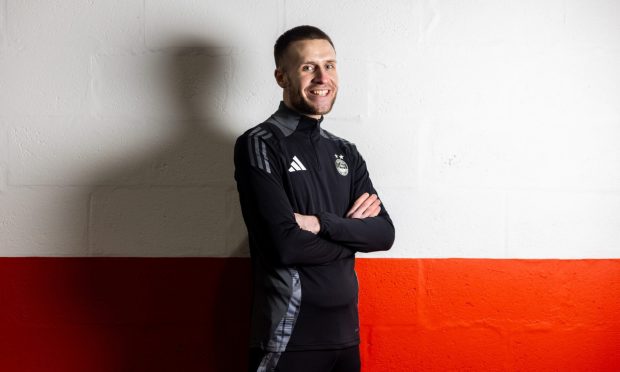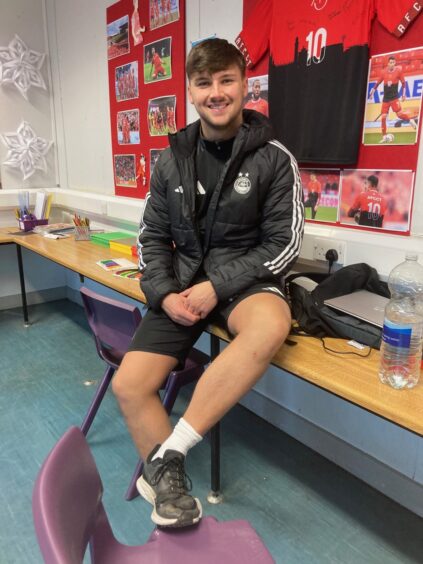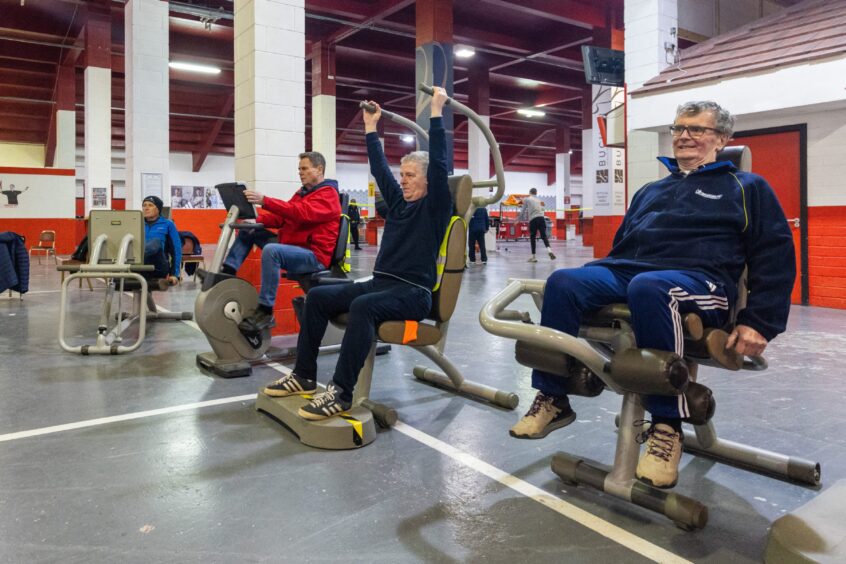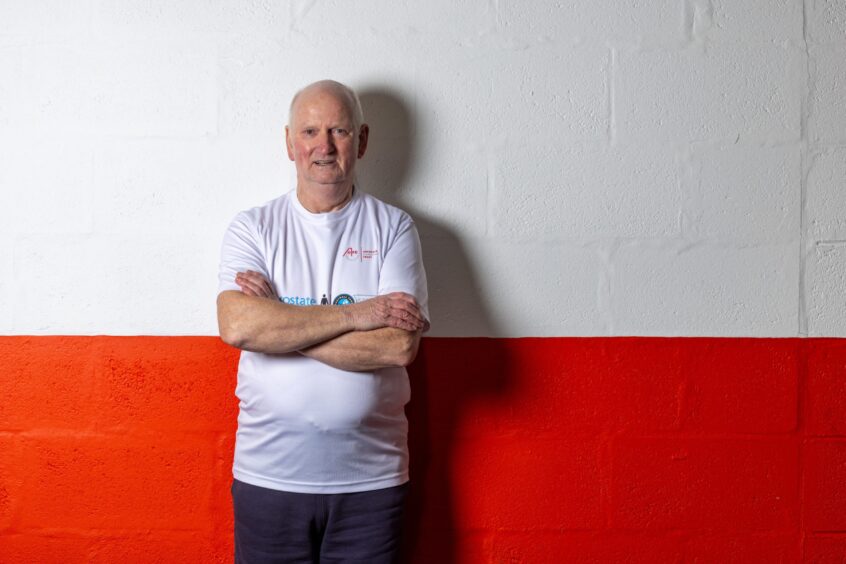This Saturday at Pittodrie Stadium, Aberdeen FC takes on Kilmarnock in another important Scottish Premiership match.
But this weekend the occasion is about more than just football.
It’s also the annual Community Trust Day, a chance to shine a spotlight on the club’s charity partner, the Aberdeen FC Community Trust (AFCCT).
That spotlight is much needed, because for many fans, the depth of the Trust’s impact remains largely unknown.
“Lots of people are aware of what we do, or at least the name,” says Duncan Peter, AFCCT’s business development manager. “But very few probably realise the full extent of it.”
That, AFCCT believes, is a missed opportunity.
While the football team’s on-pitch struggles have been well documented, the Trust is performing at an elite level. In footballing terms, you could argue it’s 1983 all over again — the year Aberdeen conquered Europe.
Meanwhile, other clubs — both in Scotland and beyond — are taking note, looking to Aberdeen as a model of how football can be a force for good in the community.
Why St Machar Academy is ground zero for AFCCT’s education effort
Ask someone at AFCCT what the fans know least about its work, and they’ll tell you about St Machar Academy.
The closest high school to Pittodrie, it may seem an obvious candidate for AFCCT’s involvement (even though the school’s most famous footballing alumnus, Denis Law, famously never played for the Dons).
But the big surprise is how embedded AFCCT is in the school.
The charity has its own room in the building — a former classroom, which on the day I visit is filled with banner designs the pupils are working on for a half-time appearance they are due to make at Pittodrie on Saturday.
My guide is Murray Collie, who is in charge of the MINDSET development programme for AFCCT. Murray has been part of the programme since he set it up at St Machar in 2019, taking it from a one-person project to one that covers a number of local schools.
Today, in St Machar alone, AFCCT has two representatives who work full-time making the charity, as Murray puts it, “part of the fabric of the community at the school.”
And he adds: “I think people don’t quite understand how unique that is for a football club.”
‘I’m new Murray and he’s old Murray’
Murray Hunter is one of the two AFCCT staff embedded at St Machar, having taken over from Murray Collie last year. He laughs at the potential for confusion, but says everyone has coped so far.
“I’m new Murray and he’s old Murray,” he says with a grin.
Dressed in an Aberdeen FC tracksuit and shorts, new Murray leads the way to the class he’s taking, calling out to pupils as he passes.
“We don’t speak to them like a teacher,” Murray, 23, tells me. “We are more on their level.”
‘Old’ Murray adds: “We play more of a pastoral role with the pupils. We’re like a guidance teacher, in a way, and try to be more approachable. We are here to build relationships.”
Dealing with class 1B and bringing order to chaos
We reach our destination – class 1B – and are greeted with low-key chaos.
It’s the last period of the day and the Murrays have their hands full controlling a roomful of 12-year-olds who clearly have one eye on the clock.
But old Murray, who spent five years working on the AFCCT programme at St Machar, knows exactly how to deal with the situation.
Leaning into the hubbub, he turns the lesson into a game, giving the children a minute to come up with as many answers to a topic as they can.
Soon, the children are noisily discussing ice cream flavours, types of emotions, and countries in Europe (“Do you mean European countries or EU countries?” pipes up one pupil, who for a 12-year-old seems commendably on top of modern geopolitics).
So when the Murrays move on to the main thrust of their lesson – how pressure can affect mental health, and even lead to substance abuse – the class is actually listening.
How Murray got involved with AFCCT
With new Murray firmly in charge of 1B, old Murray and I escape to the AFCCT classroom.
Here, in the relative quiet, the 25-year-old from Stonehaven tells me how he started out at the charity doing work experience when he was 14, back when the organisation was still known as Aberdeen FC in the Community.
Murray loved it and has been there ever since — first as a volunteer and then later, after the Trust became an official charity in 2011 and he’d completed a three-year sports science degree at Stirling University, as its education officer.
That’s when he set up the MINDSET programme I’d just seen in action.
AFCCT also runs it at seven other local schools and in 2023-24 put almost 800 pupils through the 12-week course, which aims to give pupils better life skills to cope with mental health through conversations in the classroom.
“We’re not getting kids into a classroom and saying, right, this is what depression is,” Murray explains. “We’re very much giving strategies to try and promote mental wellbeing. And if you look at what’s available for young people across the UK, there’s not really much like it.”
Why AFCCT is a leader among football charities
Around the country, other charities are taking note. MINDSET was formed out of a partnership with US development group Grassroot Soccer, which chose AFCCT to be its first European partner.
Murray says the plan now is to expand MINDSET, using schools like St Machar as the model.
“The aim is to eventually provide this level of mental health education to schools beyond Aberdeen,” he explains. “The idea is that Hearts could adapt it to fit their own club culture, for example. Yes, it’s our programme, but they can put their own spin on it – almost like franchising it.
“The goal is to ensure that this unique way of talking about mental health in the classroom can be used by as many football clubs and trusts as possible.”
A different sort of AFCCT project
AFCCT’s community reach is also on show the next day when Murray invites me to a room under Pittodrie’s Richard Donald Stand.
Here, about 20 men who have all been through prostate cancer diagnoses are discussing everything from the difficulties in getting a GP appointment to Aberdeen’s lack of public toilets.
A conversation about pelvic floor exercises is interrupted when one of the group says he has to dash off to the toilet.
“All this talk is making me need to go,” he jokes, to knowing laughter.
The group is another of the AFCCT projects overseen by Murray. Going by the name of Prostate Fit, it’s designed to give these men a chance to have a weekly meet-up with people going through the same experience as them.
There is also a fitness element — studies show that cancer recovery can be improved with regular exercise — and after the chat we file down to the stadium concourse, where Murray and the rest of his team have set up badminton courts and a selection of exercise equipment.
“It’s the camaraderie,” says Bob Dunlop, explaining what he gets out of Prostate Fit. The 76-year-old has just finished 20 rounds of radiotherapy after his prostate cancer diagnosis two years ago and loves being able to talk frankly about his condition.
“They are there to listen to you, to help you and guide you,” he says. “And hopefully they come up with the right answer at the end of the day.”
And then he laughs, adding: “But who the hell has actually got the right answer, you know?”
Why AFFCT is ‘more than just football’
Around the exercise equipment lies some of the banners the pupils at St Machar have been working on and are due to take out onto the pitch on Saturday.
It should prove to be a day to remember for the school, as alongside their halftime appearance, one St Machar pupil will have the honor of reading out the team sheets over the PA system.
Ultimately, however, the day will be a reminder for Aberdeen fans of the work being done in their name all over Aberdeen and the Shire.
“We’re more than just football,” Peter Duncan says back at AFCCT headquarters. “That’s what we want to get across to the rest of the community.”






Conversation